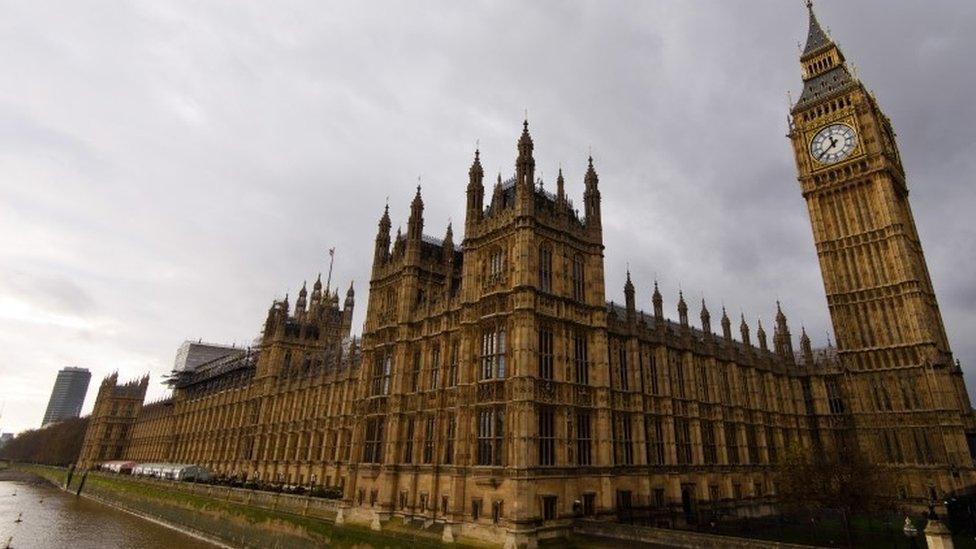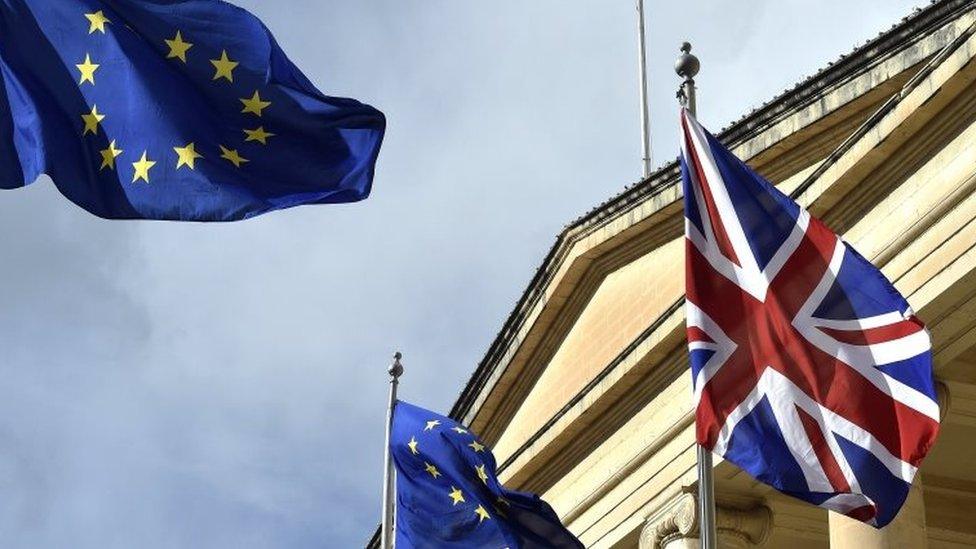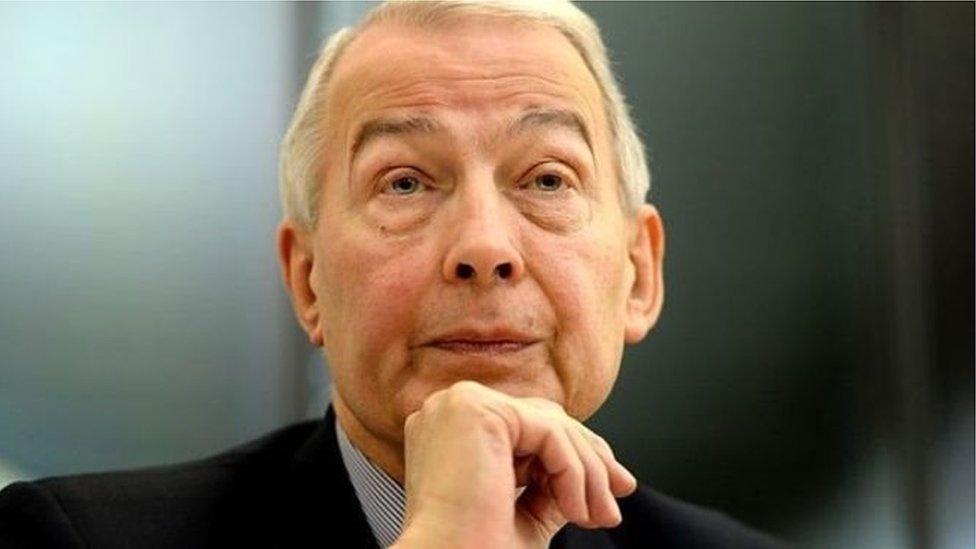The week ahead in Westminster
- Published

It's the last Commons week before Christmas, and business in Parliament has a distinctly European flavour, with the EU Referendum Bill ping-ponging between Lords and Commons, perhaps a couple of times, as Peers and MPs face off on the question of votes for 16-17 year olds.
MPs will also be discussing a rather routine-looking Euro-bill on some minor treaty changes, but they'll be following up with what looks like a rather more controversial debate on two EU policy papers on migration issues.
And the European Scrutiny Select Committee (proprietor, Sir Bill Cash) will be publishing a report on Renegotiation of EU Membership Parliamentary Sovereignty and Scrutiny.
Monday, 14 December

The Commons meets at 2.30pm for Communities and Local Government Questions.
As usual, the end of question time is the opportunity for ministerial statements or urgent questions on any issue that has come up over the weekend.
After that, MPs move on to the European Union (Approvals) Bill [HL] - taking the Committee stage, Report stage and Third Reading - in a single sitting with Foreign Office Minister Priti Patel batting for the Government.
This Bill fulfils a requirement of the European Union Act 2011 that EU legislative proposals based on the "catch-all" Article 352 of the Treaty on the Functioning of the European Union must be approved by an Act of Parliament before the UK can support their adoption in the EU Council.

The Bill deals with two relatively uncontroversial proposals concerning the Republic of Macedonia becoming an observer on an EU human rights body and a draft decision on the Tripartite Social Summit for Growth and Employment. Anything with the word "Europe" in it can run into difficulty, but no amendments have been put down, so far, signalling that MPs are unlikely to make many waves on this occasion.
Much more controversial are two motions to take note of EU policies on the relocation of migrants in need of international protection and on the European Agenda on Migration - the UKIP MP Douglas Carswell has an amendment down on the second of these, complaining that it makes no mention of Saudi funding for ISIL, which, he says, has led to mass displacement of people in Syria; and complains that majority Sunni and Gulf states are not assisting in the resettlement of Syrian refugees.
The adjournment debate is on finance for student nursing - the Labour MP Wes Streeting is concerned that converting the NHS's bursaries for student nurses to loans will make it harder to attract much-needed new recruits to the profession and will mean that the disposable income of newly qualified nurses is reduced, while they repay the loan.
In the Lords, at 2.30pm, another new peer arrives: Baroness Watkins of Tavistock - emeritus Professor of healthcare leadership at Plymouth University. She will sit as a Crossbencher.
Peers will be dealing with Commons amendments to the European Union Referendum Bill - which means reacting to the vote by MPs to strike down their amendment which would have allowed 16 and 17 year-olds to vote. The expectation is that, even though the Commons has played its trump card and asserted its "financial privilege" on this issue (in effect saying that peers can't interfere because of the £6m cost of their amendment) there will be an attempt to offer up an "amendment in lieu" which would suggest savings that might be made to allow the lower voting age. If that happens there will have to be another Commons vote on the issue, probably on Wednesday.
Otherwise, Peers will be considering the detail of the Welfare Reform and Work Bill - the subjects due to be covered are more on the welfare benefits provisions, loans for mortgage interest and social security administration. (The final committee day is on Monday, 21 December)
Tuesday, 15 December

The Commons opens at 11.30am with Business, Innovation and Skills Questions, and that will be followed by a Ten Minute Rule Bill from the Labour chair of the Work and Pensions Committee, Frank Field, pictured below, on Free School Meals (Automatic Registration of Eligible Children). He has attracted an impressive collection of backers for this measure, which is one component of his wider campaign on hunger - he co-chairs an all-party group on the issue, which has just reported, and recommended a series of measures, some centred around school meals, designed to stop people going hungry.

The day's main debates are on two Labour motions, first on climate change and flooding, and then on the government's housing record.
The adjournment debate, on Transgender Prisoners, is led by the shadow minister for women and equalities, Cat Smith. She has been questioning ministers about the number held in segregation units or placed in vulnerable prisoner units.
In Westminster Hall the subjects covered include Transport for London funding, the effect of the Spending Review and Autumn Statement 2015 on Wales, specialist neuromuscular care and treatments and access to justice in Wales.
In the Lords (from 2.30pm) the day's main legislative action (unless the EU Referendum Bill bounces back again) will be on the detail of the Bank of England and Financial Services Bill.
Watch out for a vote on changes to the "reverse burden of proof" requirements placed on banks and other financial institutions in the wake of the credit crunch, to show that they are following good practice; critics say the Government is quietly loosening the rules imposed in the previous Parliament.
Wednesday December 16th

In the Commons, half an hour of International Development Questions at 11.30am is followed, at noon, by the final Prime Minister's Question Time of 2015.
The day's Ten Minute Rule Bill is the one which was supposed to have been floated two weeks ago, only to be postponed in favour of the Syria debate. Labour MP Jonathan Reynolds will propose his Representation of the People (Proportional Representation) (House of Commons) Bill.
As I noted in my preview a fortnight ago, it does what it says on the tin and Mr Reynolds, a long standing supporter of proportional representation, who voted "yes" in the AV Referendum back in 2011, will argue that the First Past the Post system for electing MP's is "simply unfair and no longer fit for purpose." And he will point "massive discrepancies" in the number of seats a party got in the last election, compared to their share of the vote.
Next comes detailed consideration of the Armed Forces Bill - watch out for an amendment on compensation for service personnel with mesothelioma as a result of exposure to asbestos - at the moment they get worse compensation terms than civilians. Then, MPs turn to a motion on benefit changes from Work and Pensions Secretary Iain Duncan Smith, which follows the Chancellor's autumn statement announcement that he was not planning to implement the tax credit cuts he'd previously announced. The vote is to allow a breach of the welfare cap in 2016-17, 2017-18, and 2018-19 which results from that decision.
In Westminster Hall the 2.30pm debate on benefit sanctions, led by the SNP's Dr Eilidh Whiteford caught my eye.
In the Lords (3pm) the main legislative action comes in the second day of Report Stage scrutiny of the Education and Adoption Bill - look out for government agreeing to extend the Bill's provisions on coasting schools to cover academies (having said this was unnecessary during the committee stage, and then spotted a possible defeat looming). Lib Dems Lord Storey and Baroness Pinnock propose a new clause giving local councils the ability to set up a committee to review and scrutinise education provision, where more than 10% of schools in a local education authority area classified as coasting, and requiring Regional Schools Commissioners to attend to answer questions. There will be several amendments on adolescent mental health services, and the Bishop of Ely proposes a new Clause on Protection for schools which have a religious character.
Thursday, 17 December

In the Commons it's the last day of term (starting at 9.30am) and MPs begin with Environment, Food and Rural Affairs Questions. That's followed by mini-question-times for the Church Commissioners, the Public Accounts Commission and the Speaker's Committee on the Electoral Commission.
The rest of the day is devoted to debates chosen by the Backbench Business Committee - opening with a motion on protecting 16 and 17-year-olds from child sexual exploitation based on The Children's Society's report "Old enough to know better?".
The motion calls on the government to give police the same tools to intervene when a 16 or 17-year- old is being targeted and groomed for exploitation as they have younger children. (the Conservative Kit Malthouse and Labour's Ann Coffey lead the discussion). Then MPs move on to a motion on Conception to Age 2, the first 1001 days - picking up recommendations made by an all-party group before the election (Conservative MP and former children's minister Tim Loughton and Plaid Cymru MP Liz Saville Roberts take the lead).
And in Westminster Hall (1.30pm) there will be a general debate on a new tobacco control strategy led by Labour's Sir Kevin Barron.
The Lords (who're continuing, remorselessly, into next week) open at 11am by welcoming Baroness Brown of Cambridge, the Vice-Chancellor of Aston University. She is a member of the Committee on Climate Change, the Airports Commission, and has served as a non-executive Director of the Department for Business, Innovation and Skills.
The day's debates are on subjects chosen by backbench peers: on the Outcome of the Commonwealth Heads of Government Meeting in Malta on 27-29 November (Lord Luce) and on the positive contribution made by the National Lottery to sport, culture, charities, and national heritage throughout the UK (Lord Holmes of Richmond).
Neither House sits on Friday December 18th.